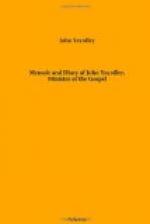the Scriptures in the Flemish tongue. About that
time the colporteurs introduced the New Testament
in Flemish, and some copies of the Bible, which greatly
excited the priests, and in particular the bishop,
who said the translation was mutilated and falsified,
and commanded that the members of the Catholic Church
who had received copies, should either burn them themselves,
or bring them to the cures for that purpose. Van
Maasdyk’s parishioners accordingly brought their
Bibles and Testaments (five copies) to him to be burned.
He was zealous in the Romish faith, and had preached
violently against the distributors of the wicked books,
as they were called; and he was about to fulfil the
command to burn them, when suddenly he felt something
in his heart which restrained him, and he thought,
I will at least first examine the foundation of the
bishop’s charges. He took up his Latin
Bible, and placing beside it the copy in Flemish,
began with the charge of mutilation. He found
it not at all abridged. He then went to the charge
of falsification, and found the two copies to agree
with slight variations here and there; in fact, the
modern translation proved to have been made from the
Vulgate, which was the one in his possession.
He read the denunciation of our Saviour, “Woe
unto you Scribes and Pharisees, hypocrites,”
and it struck him forcibly; he felt that he must say,
“Woe is me, I am one of those who deceive the
people.” He read again, “There is
one Mediator between God and man;” and here again
his conscience smote him: “Woe is me, I
teach the people in their confessions that the saints
make intercession.” His sorrow was so deep,
that he thought he could die a thousand deaths rather
than continue a Romish priest.
Now his persecution began. He was beloved by
his flock, who entreated him not to leave them.
After much conflict of mind, he wrote a decided letter
to his bishop, who in the end gave him his dismissal.
Still feeling himself called to proclaim the Gospel,
he began to assemble the people in little companies,
and to instruct them in the Scriptures. At the
entreaty of his friends he settled at Brussels, where
there was a wide field for labor amongst the poorest
of the Roman Catholics, who speak only Flemish.
His congregation consisted at first of some fifteen
or twenty persons; but such was the success he met
with, that they have been obliged four or five times
in succession to seek a larger building, and his congregation
now consists of 500. He is said to be one of
the most powerful preachers in the Flemish language.
It is delightful to be in his company; his heart is
filled with gratitude, and his eyes sparkle with joy,
when he is with those who love the Saviour. Nothing
is paid him by his congregation; he has a little property
of his own, and sometimes receives a little help from
the Adolphus Society.
After a long conversation with him on the spiritual
nature of worship, he took us to see some of his flock,
with whom we had family sittings from house to house.
This is exactly the class our hearts longed to visit;
thanks be to our Heavenly Father who has thus opened
our way.




